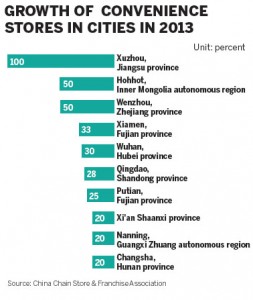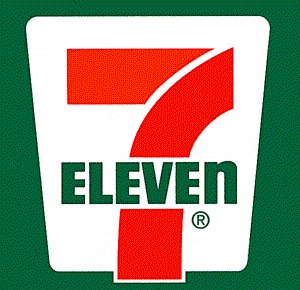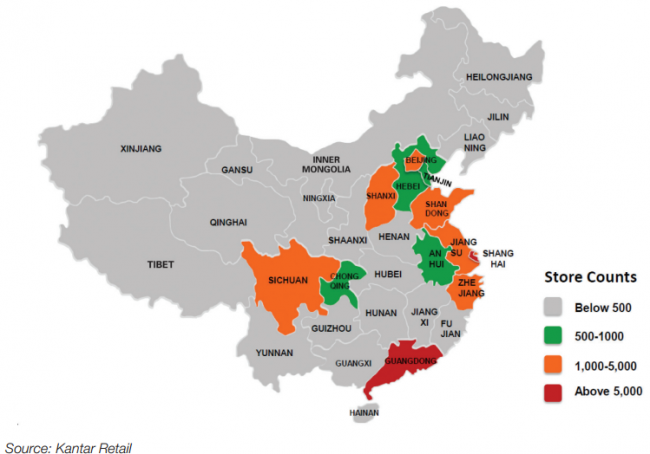Convenience store in China is becoming one of the fastest growing industries. It is a big feature of China`s increasingly affluent, youth-oriented consumer culture. In 2013, the number of convenience stores in China was 19.5% higher than that in 2012. The speed of opening new stores was much faster than that of shopping malls and supermarkets. Especially in Wenzhou, Hohehot and Xuzhou, the increase rate exceeded 50%. There are about 176 convenience store brands in the 26 cities being investigated, despite those local stores without chains. The net profit margin of convenience stores in 2012 is 3.35%, which is the highest among all kinds of stores.
Development of convenience stores in China
The development of convenience stores in China is somewhat unbalanced. In some cities such as Shanghai and Guangzhou, competition is extremely fierce. But in other cities, especially the lower-tier ones, development is lagging to a greater extent.
Convenience store chains have had mixed success in China. Several local stores dominate Shanghai, while one foreign operator controls Guangzhou and none have significant operations in Beijing. Leading players are looking to extend beyond their home cities and are likely to acquire weaker local operators. While some dwellers rely on small mom-and-pop stores for convenience staples, including cigarettes and beverages, in the high-income cities—such as Shanghai and Guangzhou—chain stores offer a more attractive option.
In Shanghai fast-expanding local and Japanese chains controlling the sector. However, in Guangzhou and Shenzhen, the sector is dominated by 7-Eleven, with its franchise managed by HongKong-based DairyFarm International, which is part of the Jardine Matheson Group.

According to Convenience Store Index in Cities in China, published on April 23th 2014 by China Chain Store & Franchise Association, Shenzhen, Dongguan and Taiyuan ranked the top three with the highest rate of expansion speed, saturation rate and the percentage of 24-hour service among all convenience stores. On this list, Shanghai, Guangzhou and Chengdu ranked 6th, 9th and 10th respectively.
Value-added 24-hour services provided by convenience stores differentiate this retail format from others. But the operating hours in China`s CVS are not high. Only half of stores open 24 hours a day. And most of 24-hour stores locate in southern and coastal cities as the night life is more abundant in those areas. Convenience store with its natural competencies, including proximity to communities and office buildings, quick shopping experience,is easier to position itself in a certain community. Although taste variance and diet variance in different regions throughout China must be considered by retailers, convenience stores with constantly changing stocks can quicker respond to market changes and new trends than large supermarkets. Also, to open a convenience store is a good choice for business operators with limited fund. Thus, a flood of CVS businesses have sprung up from metropolitans to third-tire cities in China. Some famous convenience store brands in China are Lawson, Family Mart, Seven & Eleven, Kedi and Meiyijia. These convenience stores quickly expand their business through chains and franchises.
Why convenience stores are thriving in China?
According to Kantar Retail China Convenience Market Report, it is important for convenience store to locate near four areas, namely, neighborhood, commercial area, travel terminals and tourist attractions, schools and hospitals which will serve different types of customers. From 2003 to 2011, the compound annual growth rate of the sales of China`s convenience store is 24%.
Why China`s convenience stores are thriving? 30% of revenue at Seven & Eleven and Family Mart comes from box lunches and sushi. Convenience stores act as canteens for white collar professionals and students. They usually don`t cook for themselves, but grab prepared meals and go. They are short on time and want affordable but relatively high-quality food.
In a research held a student from Fudan University (Shanghai), about 90% CVS visitors of 336 samples are from 21 to 30 years old. 58% percent of consumers go to CVS 1 -3 times per week. The main motives of visiting CVS are emergency and proximity. People go to CVS for necessities, but not all of the stores offer them as fast food and snacks are the main income source in convenience stores. In Shanghai, consumers choose Family Mart more than other shops because of comfortable tables and chairs for having dinner. Apart from food service, consumers value product quality, shopping environment, convenience service (e.g. fast payment for mobile phone service) and price and hope that more convenience service will be offered in the future. Although CVS are small, it offers products with price range targeting different income group. For example, the price for a bottle of drink varies from about 2 RMB to 10 RMB, from water to mid-end juice and milk tea in Family Mart.
Although CVS business are affected by increasing high rents which is an overall hurdle for all businesses due to the unreasonable development of real estate industry, the business still has room for continuous growth and further development. Outwardly the competition in convenience store is fierce. However, there are still many aspects that stores could improve to win market shares. First, the most difficult task is training staff how to greet and serve customers. shop assistant`s attitude towards consumers is confronted with a decline in customer satisfaction. The negative effect of this problem will become distinguishing because of natural selection. Second, compared to supermarkets, product price in convenience store like Family Mart and Lawson is much higher than that in supermarkets like Century Mart and Hualian.
Foreign players into this market are advised to set up unique differentiation such as value-added services, fresh food supplies, new store concepts and product mix which helps to improve margins and to avoid similarities with local stores. Foreign stores have higher management level with managers with university degree and hire third-year junior college students to reduce cost. While local stores hire older women whose service quality cannot be easily enhanced. What is more, given the vast network of convenience stores, more online retailers are considering to cooperate with CVS. They could share part of their online ordering system with CVS and send products directly to CVS customers. Foreign players could also take advantage of this trend.
To know more about Convenience store in China, please contact us.






